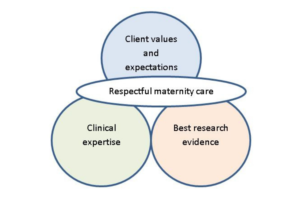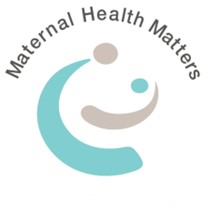Respectful Maternity Care for Healthier Mums and Babies

How a women perceives the quality of her maternity care impacts on her transition to motherhood, with consequences for her health and her baby’s health. Any mother who births should emerge feeling confident and capable of caring for herself and her baby, regardless of the pathway her pregnancy takes.
Building relationships, trust, confidence, and advocacy results in women feeling safer, less stressed, and more secure and respected.
Both mothers and babies experience life-long benefits from receiving respectful maternity care
Disrespectful maternity care remains a significant public health issue, with an ever increasing number of women emerging from pregnancy and birth feeling traumatised as a consequence of the disrespect and abuse they encounter. This abuse, can vary from verbal insults to a refusal of information, authoritarian behaviour, such as forced immobilisation, forced monitoring, an unwanted vaginal examination or episiotomy, or a refusal of pain relief – that is any act that forces the pregnant woman to undergo something against her will or which strips her of her dignity, including the problem of obstetric violence that arises in the context of over-medicalising birth.
As we see an ever increasing use of interventions, we also see a falling normal birth rate and a rising caesarean section rate. As a consequence, thousands of mothers and babies miss out on the health benefits of a normal delivery, and are exposed to increased risks of injury, infection, haemorrhage, infertility, impact on future pregnancy, long-term poor health and long-term childhood outcomes.
To prevent poor outcomes, above all else, there is an imperative to empower pregnant women.
Mothers want to do what’s best for their babies. But for mothers with limited knowledge and/or experience of pregnancy and birth within their family and networks, this desire can make them vulnerable to a lack of self-efficacy; trusting long-standing cultural traditions or the experience of their peers, rather than trusting their bodies’ abilities to grow and birth a baby. We need to empower each pregnant mother to be confident by:
- Describing the capacity of her body, explaining she is the only person who can grow her baby, and that she is perfectly designed to grow and birth a healthy baby.
- Recognizing that each mother has a different view on pregnancy and birth and that by preparing for birth, making informed decisions and documenting her decisions and hopes will help her to achieve the birth she wants.
- Ensuring their fundamental right to respect – including when they are pregnant and in childbirth. Each woman must be treated as a person capable of being informed, and of making decisions for herself and her child. This means maternity care systems that are capable of honouring the individual needs of each woman and respecting her choices concerning birth.
All involved need to remember to practice compassionate, mother-centric maternity care.
REFERENCES
Oonagh E. Keag, Jane E. Norman, Sarah J. Stock; Long-term risks and benefits associated with cesarean delivery for mother, baby, and subsequent pregnancies: Systematic review and meta-analysi; PLOS Medicine; https://doi.org/10.1371/journal.pmed.1002494 January 23, 2018
Neelima Choahan; Birth interventions negatively impact child’s long-term health; The Age; March 2018
Lilian L. Peters PhD, Charlene Thornton RM, PhD, Ank de Jonge RM, PhD, Ali Khashan PhD, Mark Tracy MBBS, PhD, Soo Downe RM, PhD, Esther I. Feijen-de Jong RM, PhD, Hannah G. Dahlen RM, PhD; The effect of medical and operative birth interventions on child health outcomes in the first 28 days and up to 5 years of age: A linked data population-based cohort study; Birth Issues in Perinatal Care; https://doi.org/10.1111/birt.12348; March 2018
World Health Organisation The prevention and elimination of disrespect and abuse during facility-based childbirth.pdf; 2015
